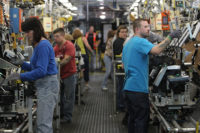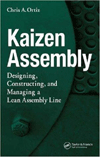On the one hand, manufacturers say they are unable to find and hire workers. On the other hand, people out in the “real world” are contradicting this view.
President Harry Truman is alleged to have said that the only economists he would talk with had to have only one arm because, “Then those rascals can’t give me this, well, on the one hand it could be this way, but on the other hand it might be another way, baloney.” Whether true, or apocryphal, it’s closely analogous to the on-going argument about whether we have a shortage-or a surfeit-of skilled workers.
On the one hand, manufacturers say they are unable to find and hire workers. For example, writing recently inUSA Today, Barbara Hagenbaugh says manufacturers across the United States, regardless of size, specialty or location, are reporting a dire shortage of skilled workers. This includes welders, electricians or machinists with a craft that goes beyond pushing buttons or stacking boxes but does not require a degree. That shortage is threatening their ability to meet current demand, let alone expand their businesses, she says, and also could threaten the viability of the U.S. manufacturing sector when it is facing heavy competition from abroad.
On the other hand, people out in the “real world” are posting comments contradicting this view onUSA Today’s Small Business Connection blog. A machinist with 30 years experience, including setup and programming CNC machines, says there are jobs-if he’s willing to work for less than the $5 an hour he earns driving a limo. Another cites hidden age discrimination, saying that companies complaining about the lack of qualified job applicants want experience but aren’t willing to pay for that experience.
Welders and machinists, and skilled workers from the auto industry, take particularly strong issue with the contention that employers can’t find skilled help. There are plenty of skilled workers ready to work, they say, but the manufacturers won’t pay even close to a living wage. The common thread in many responses is that the demand for skilled technical people is dwindling because so much manufacturing is outsourced or done offshore. One auto worker says we can only compete with the emerging economies if American workers will live like them! You can read more responses, pro and con, athttp://www.usatoday.com/money/economy/employment/2006-12-05-skilled-workers-shortage_x.htm.
This dichotomy won’t be corrected in the short term, and not at all unless leaders in business, education and labor unions resolve to work together. In particular, some of the company presidents and CEOs who expect to hire capable and reliable workers will have to step up to the plate with money for truly competitive pay and benefits, as well as for training.
But there’s one thing you can depend on. If you hear “I’m from the government and I’m here to help,” grab your wallet! Generally speaking, the further government bureaucrats can be kept away from “solving” any problem, the more likely it is that a solution genuinely beneficial to free citizens will be developed. Jobs and paychecks are way too important to leave in the meddlesome hands of bureaucrats.
Editorial: Jobs? Yes, But Do They Pay?
Looking for a reprint of this article?
From high-res PDFs to custom plaques, order your copy today!






